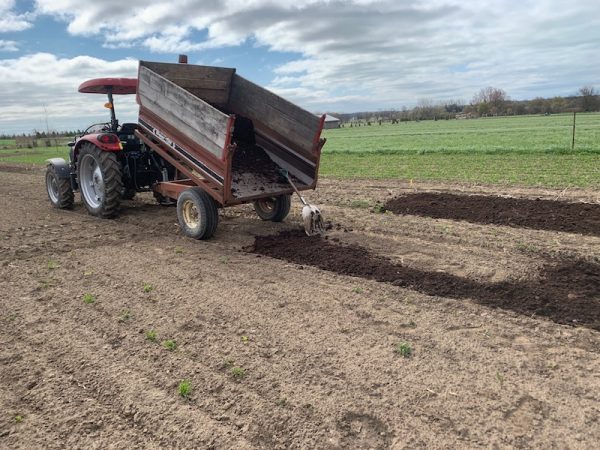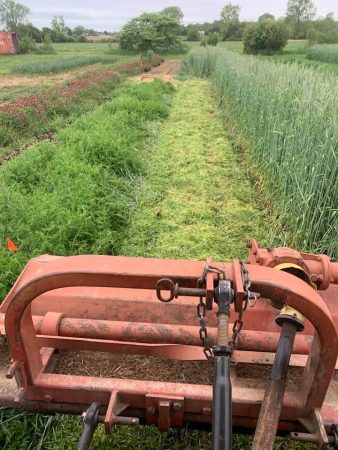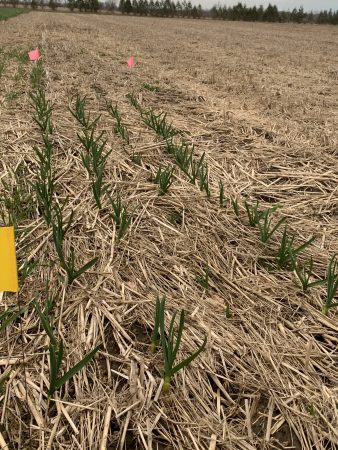
Features
Associations
Organic production
Research
Exploring organic no-till vegetables in a “Living Lab”
June 21, 2021 By Laura Northey, Ecological Farmers Association of Ontario
 Ken Laing spreading compost for deep compost mulch trial. All photos courtesy of the Organic Council of Ontario.
Ken Laing spreading compost for deep compost mulch trial. All photos courtesy of the Organic Council of Ontario. A new partnership between the Ecological Farmers Association of Ontario (EFAO) and Agriculture and Agri-Food Canada (AAFC), starting this summer, seeks to make it easier for mid- to large-scale growers to reduce tillage and increase cover in their vegetable cropping systems.
Through the Living Lab: Ontario project, federal scientists will collaborate with Ontario organizations and farmers to address urgent questions. One EFAO farmer-member, Ken Laing of Orchard Hill Farm, will compare different winter-killed and rolled cover crops and mulching systems for their ability to reduce tillage and maintain continuous cover for transplanted and direct-seeded organic vegetable crops with support from the partnership.
“EFAO farmers have been talking about no-till practices for years now, but prioritizing soil health needs to be common practice, not niche,” Laing says. “We need to make it accessible for larger farms. So, mechanization and scalability are important.”
Using equipment he tested and optimized for planting into cover crops, Laing will run trial-plantings of spinach, peas, beans, sweet corn, tomatoes, sunflowers, squash, potatoes, broccoli and garlic in different treatments: winter-killed cover crops, deep compost mulch, and mown and/or roller/crimped cover crops.
Some crops will be seeded, some transplanted and some will include both. The techniques that show the most promise in side-by-side plots in 2021 will be explored further in 2022, the final year of the current project.
Led by the Ontario Soil and Crop Improvement Association (OSCIA), Living Lab: Ontario collaborators include farmers, agricultural and conservation organizations, including the Essex Region Conservation Authority, Innovative Farmers Association of Ontario, Lower Thames Valley Conservation Authority, Ontario Soil Network, and Upper Thames River Conservation Authority, as well as scientists from AAFC and Environment and Climate Change Canada.
 Flail-mowing rye and vetch in a potato plot pre-emergence. |
 No-till garlic plot in winter-killed sorghum-sundangrass. |
The Living Laboratories Initiative is an integrated approach to agricultural innovation that brings farmers, scientists, and other partners together to co-develop, test and monitor new practices and technologies in a real-life context. Research will focus on reducing soil and nutrient runoff from agricultural land into Lake Erie, improving water quality, boosting soil health, and increasing biodiversity on agricultural land in Ontario. They will share their expertise with farmers across Canada to help accelerate the adoption of increasingly sustainable practices and technologies.
EFAO’s other Living Lab: Ontario project is a field-cropping trial that will see Brett Israel of 3Gen Organics compare traditional tillage, soybeans no-till planted into cereal rye, and short-season soybeans double-cropped after winter barley.
You can find ongoing updates and results of Laing’s trials on the EFAO website and Facebook page.
Print this page